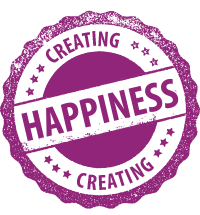Have you ever experienced any of the following anxiety symptoms: shortness of breath, a smothering sensation in your chest, dizziness, heart palpitations, trembling, sweating, a choking sensation, nausea, abdominal stress, numbness, tingling in your extremities, flushes, chills, or chest pain?
I for sure have experienced some of them in the past and, just like you, know that they are not pleasant.
Anxiety is your brain’s reaction to perceiving your world as unsafe. It is the old part of your brain being activated, your reptilian brain, which is always checking if you are safe or not. When it perceives your world as unsafe, it gets you ready for fight or flight, which then produces all the anxiety symptoms.
If you have a full-blown panic attack, your body is reacting as if you were in a life-threatening situation, as if a freight train is coming right at you. You will have many of the above-mentioned symptoms at the same time, and that can be terrifying. That is why many people end up in the ER after having their first panic attack. They literally fear they are dying.
In our brain, anxiety shows up with a lot of “what if” questions and a tendency to catastrophize. For example, some of the thoughts your brain might come up with are, “What if I lose my job and end up homeless?”, “What if this plane will crash?”, “What if I have cancer?”, “What if nobody will ever love me?”, “What if my kids die?”, and so on.
Our brain has a really hard time distinguishing between fantasy and reality. So if you focus on those potential catastrophic outcomes and ruminate on them, you will experience a lot of anxiety, because your emotions don’t have a choice, they will follow your thinking.
How I see it, is that worrying is optional suffering, which you can learn to refuse!
I am now in my mid-40’s and have lived long enough to know that most things I have feared have not happened. However, shit has happened, that I could barely have imagined. I am done wasting my time worrying.
How can you learn to refuse to worry? Glad you asked! Here are some tips:
1. Learn to practice cognitive defusion.
Cognitive defusion is the art of letting your thoughts come and go without automatically hooking into them. Keeping in mind, that your thoughts are not the truth, they are just automatic brain reflexes. This skill teaches you to become a proactive thinker and start leading your brain, instead of being led by it.
It is a bit like envisioning a thought like a cloud floating across the sky. You can notice it, let it pass by, without responding to it. Or, it is like imagining a thought like a leaf floating down a stream. You don’t have to dive in. You can watch it pass by from the bridge.
Cognitive defusion is a tool that, with practice, will allow you to let unproductive thoughts pass by without getting involved with them, and to instead consciously engage with productive thoughts. This will allow you to avoid a ton of emotional pain!
If you want to learn more about cognitive defusion, check out my blog on “Learn[ing] the Power of Cognitive Defusion: How to Let Useless Thoughts Go”.
2. Actively replace your anxiety-provoking thoughts with better ones.
Once you have learned to not hook into negative thinking patterns, the next step is to replace the unproductive thought with a useful one.
In my experience a good trick to find useful thoughts is to simply check in with the present moment, and ask myself, what do my senses tell me right now, am I in danger, or not? Most of the time, I discover that I am not, and my brain has simply gotten stuck in a fear fantasy.
For example, if my unproductive thought is, “I think this plane will crash and I am going to die”, I can replace it with, “Right now there is no indication that this plane will crash, I am safe and will refuse to have my mind focus on a fear fantasy. Instead, I will watch a movie and distract myself”. Or, if I have the unproductive thought of, “What if I have cancer”, I can check in with reality and replace it with a more useful thought, like, “I have no proof that I have cancer and until proven differently I will stubbornly assume that I am healthy”.
3. Use mindfulness to connect to the present moment.
Mindfulness is the quintessential antidote to anxiety. When anxious, the first step needs to be to stop, slow down, take some deep breaths and connect with your five senses to the present moment.
Ask yourself, “What am I hearing right now?”, ” What am I seeing right now?”, ” What am I touching right now?”, “What am I tasting right now?”, and, “What am I smelling right now?”.
Next, talk to your triggered brain, which is freaking out in that moment believing the fear fantasy, and say out loud, “I am here, and right now, in this moment, I am good, I am safe, everything is ok, there is nothing to worry about”. This is like deploying an army of firefighting planes extinguishing an anxiety wildfire that is ravaging your inside.
Most of your moments are good moments if you can connect to them. If you can’t, because your head is full of worry and you are entertaining fear fantasies about the future, then those perfect moments do not exist. The more you learn to connect to the present, the less anxiety you will have.
Just sitting still for 5 minutes on a daily basis and allowing yourself to connect to the present, can reduce anxiety significantly.
If you want to learn more about reducing anxiety through mindfulness practice, pick up the following book: The Mindful Way Through Anxiety by Susan M. Orsillo and Lizabeth Roemer.
4. Tap into your anger to push out anxiety.
Anger can push out anxiety. Use that to your advantage!
When you want to leave worrying and anxiety behind, use your angry energy and get a bit pissed off and testy. You could say to yourself something like, “I am done with that shit, I am done with wasting my time worrying. I am here in this moment, and right now I am good. I choose to trust that I can handle whatever will come my way, and, until then, I am determined to enjoy my life fully. And that’s that”.
5. Be smart with what you feed your mind.
We live in a complex world and are flooded daily with information that is mostly negative. So, it is no wonder that our reptilian brain is freaking out on a regular basis, getting us ready for fight or flight, which we experience as anxiety. Be proactive and wise about what messages you expose yourself to.
For myself, I stopped watching the news on a daily basis a while ago, as it simply left me feeling too anxious; so I catch up once a week instead. Also, I try to feed my brain a balanced diet, that is, I am purposeful about exposing myself to positive, encouraging messages like reading about inspiring people who try to use their life for good, reading poetry, and I have at least one spiritual book on my bedside table which helps me keep perspective.
6. Exercise regularly.
Cardio-vascular exercise releases endorphins in our brain, which is nature’s feel-good chemical, a natural anti-anxiety medication. Aim to work out at least three times a week for 20 minutes. The goal is to keep your heart rate elevated during that time and be out of breath.
However, if that is too ambitious for you at this point, start with a 10-minute swift walk around the block and increase it from there. Anything is better than nothing!
Remember the key is consistency and building a habit. If you are able to repeat a behaviour for 30 days in a row, there is a very good chance you will be able to keep it in place for a long time. Stay the course, you can do it!
If you have difficulty implementing new habits, up the ante! In her new book Everything Is Figureoutable, Marie Forleo suggests a fun way of putting skin in the game. She invites you to go online and search for accountability apps + [the current year] , which will lead you to a variety of options with a wide array of features.
Next, you determine the financial fine you are willing to pay each time you don’t stay on track. Some apps even allow you to determine what will happen with the money you lose. I was laughing out loud when the author said, “You can [even] have the cash sent to your nemesis or to an anti-charity – a cause or an organization you can’t stand. That’s taking loss aversion to the next level”. Damn right it is! I intend to try that technique out asap and invite you to join me.
7. Have a healthy work-life balance.
My experience working with people is that many of us are way too thinly stretched. Often there are two parents with demanding jobs, children clamoring for attention, the romantic relationship suffering, demands never-ending, feeling like you are on a hamster wheel, no end of relief in sight.
If you want to lower your anxiety, you need to become intentional and stubborn about down and rest time and protect it! Possibly, you could block out chunks of time each week that you can then use in whatever way you want, so you can regain strength and energy.
For example, in my life, one step in the right direction has been to commit to only one activity on the weekend, and keep the other day free. This way, my life feels more balanced which in turn helps my mental health. Could something like that work for you?
With all of those tools in place, as you implement them regularly, your anxiety has no choice but to diminish. That’s what I love about working with clients who suffer from anxiety, I can put together a treatment plan that works. It will also work for you!
References:
Everything is Figureoutable by Marie Forleo (2019)The Mindful Way Through Anxiety by Susan M. Orsillo and Lizabeth Roemer (2011)

This post is part of the blog series "Creating Happiness", your inspiration to promote positive change in your life.
Do you like Daniela's posts? Subscribe to her blog series:
ABOUT THE AUTHOR
Ms Daniela Beer-Becker, Psychologist
Daniela is a regular contributor to the Blake Psychology blog and author of the "Creating Happiness" series.
MORE POSTS IN THE SERIES
















